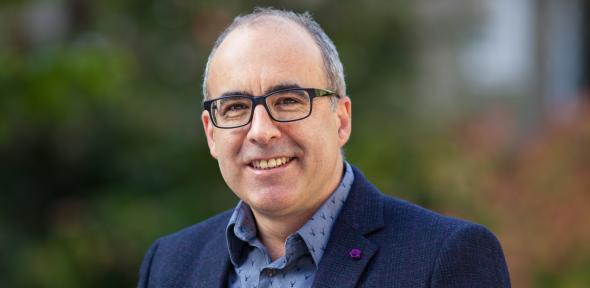
Professor Steve Jackson, Head of Cancer Research UK Labs and Senior Group Leader at the Gurdon Institute, University of Cambridge, has been awarded the Gagna A. & Ch. Van Heck Prize 2015 in Belgium, "for his cardinal contributions related to cellular events that detect, signal the presence of and repair DNA damages".
The triennial prize of 75,000 EUR from the Fonds de la Recherche Scientifique-FNRS, based in Brussels, rewards a biomedical scientist or clinician "whose work has contributed to the treatment of a currently incurable disease, or has provided an outstanding contribution to basic research, resulting into such discovery".
The award ceremony took place on Wednesday 18th November in Brussels, in the presence of H.E. Mrs Alison Rose, British Ambassador to Belgium.
Jackson, who is also Frederick James Quick and Cancer Research UK Professor of Biology in the Biochemistry Department of the University of Cambridge, said: "I am delighted and honoured to receive the Gagna A. & Ch. Van Heck Prize 2015. An understanding of DNA damage and repair processes has helped us devise new therapeutic approaches for certain types of cancers, and it is my belief that there will be opportunities to apply this knowledge to many other cancers, and also to degenerative and genetic diseases."
"This field has recently been in the spotlight with the award of the Nobel Prize for Chemistry to Tomas Lindahl, Paul Modrich and Aziz Sancar, for their discoveries on the enzymatic mechanisms of DNA repair. I and others have built on those early foundations to bring our understanding of this basic biology to clinical application." Jackson has founded two spinout companies from his research, KuDOS Pharmaceuticals and MISSION Therapeutics, to take his basic science into the drug-discovery arena and on into the clinic.
The best-known output is the drug olaparib, which is already licensed in the USA and Europe (as 'Lynparza') for use against certain ovarian cancers, and is now showing promising results in trials against breast, gastric, prostate and other cancers. Other drugs targeting DNA repair mechanisms are in further clinical trials, and it seems that yet more will follow.
Indeed the Fonds de la Recherche Scientifique-FNRS specifically praised "the capacity and willingness of the laureate to translate his key fundamental discoveries into medical options for the benefit of patients".
